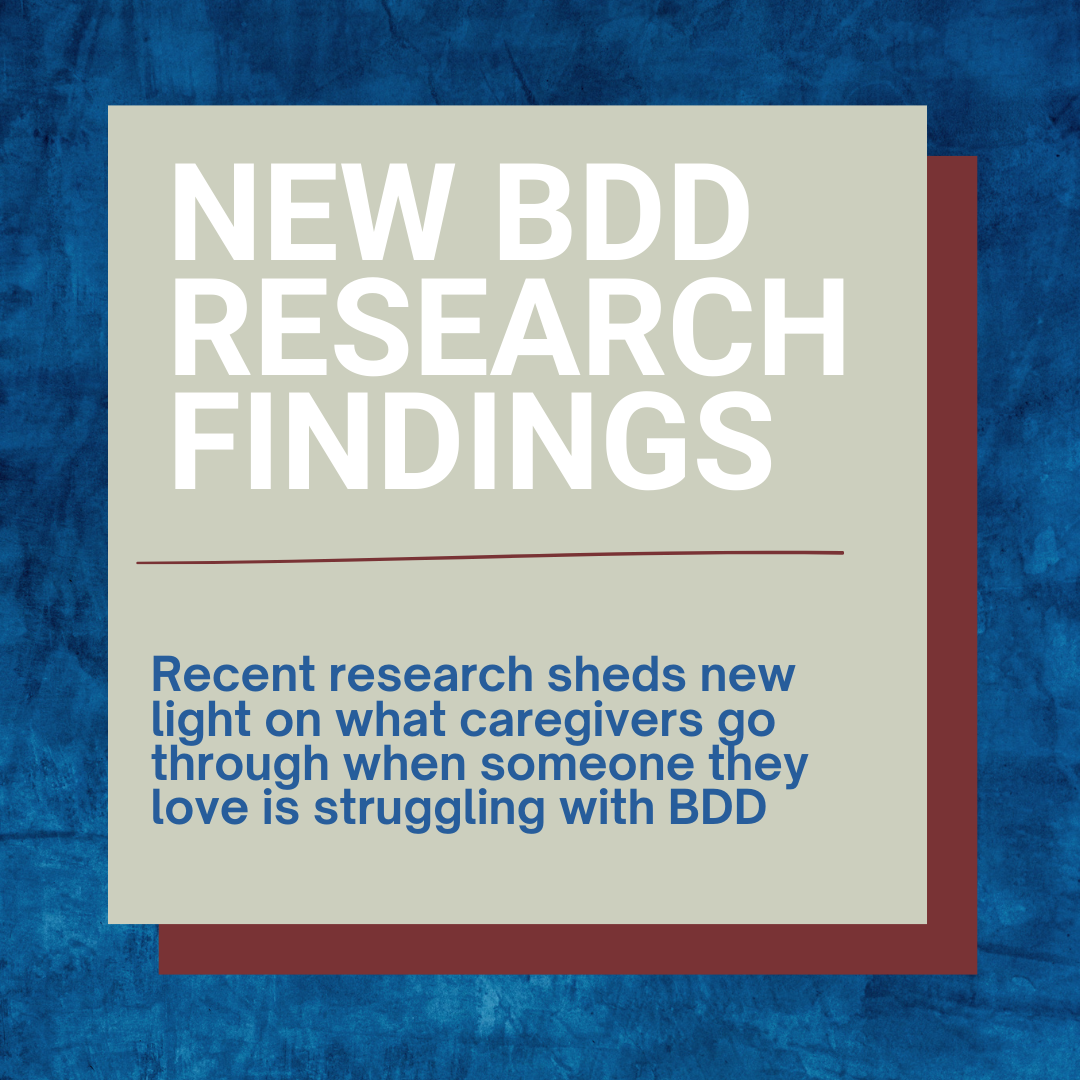Recent research sheds new light on what caregivers go through when someone they love is struggling with Body Dysmorphic Disorder (BDD)

When a loved one has BDD or severe anxiety about their appearance, it doesn’t just affect them – it often impacts the whole family. Many family members find themselves constantly adjusting their behaviour to try to ease the person’s distress – a pattern known as Relational Accommodation.[1].
This might mean helping them avoid mirrors, offering endless reassurance, or even changing day-to-day routines to avoid triggering their anxiety.
But while these adjustments come from a place of love and care, research suggests they can actually make things harder in the long run – both for the person with BDD and for the people supporting them.[2]
What Did This Study Explore?
This study led by Deanna Fallah as part of her Doctorate in Clinical Psychology at the University of Surrey was the first to ask:
- How do family members respond to the challenges that come with this?
- What is it like to live with and care for an adult with BDD or severe appearance-related anxiety?
Who Took Part?
Eight mothers of adult children (aged 18+) with BDD took part in one-on-one interviews. Most were in their 50s, and all spoke honestly and movingly about how their lives had been shaped by their loved one’s struggles.
From their stories, four powerful themes emerged.
Theme 1: Response to BDD occurs in the context of distress
For many of the mothers, their instinct was clear: do whatever it takes to stop their child from suffering. Their responses to BDD were often driven by a deep, almost innate need to minimise distress – not just for their child, but for themselves too.
“as a parent, you’ll just do anything to stop your child being in that state…”
Some mothers described living in a near-constant state of fear that their child might relapse, or that their distress could lead to crisis or harm. For several participants, past experiences had been deeply traumatic, including moments where their child expressed suicidal thoughts or engaged in self-harm linked to their BDD.
These moments left lasting emotional scars, and they powerfully shaped how mothers responded to BDD symptoms going forward, often increasing their drive to accommodate, soothe, or avoid confrontation, even when they knew it might not help long-term.
“I could not leave him unattended, at all because, erm, I mean, he was a suicide risk.”

Theme 2: Relational Accommodation and self-image continuously shape each other
Caring for someone with BDD doesn’t happen in a vacuum – it affects your sense of who you are. The mothers in this study shared how their responses to BDD, especially the ways they accommodated their child’s distress, shaped how they saw themselves, not just as parents, but as people more broadly.
“It’s changed me as a person… I’m far more empathetic about, er, people’s challenges”
For some, going above and beyond to help became central to their identity. Others struggled with guilt or self-judgment, questioning whether they were doing the right thing. Either way, their role as a caregiver wasn’t just something they did, it became part of how they defined themselves.
At the same time, their existing beliefs and values deeply influenced the way they approached their child’s BDD. For example, some felt a strong moral responsibility to protect their child from emotional pain, while others drew on personal beliefs about what “good parenting” should look like.
“it [RA] makes me feel like I’m a better parent because I’m showing empathy and kindness and understanding to my daughter who’s poorly…”

Theme 3: The gains and losses experienced in relationships
The impact of BDD and RA didn’t stay between parent and child – it often rippled out, affecting the wider family and social circle. Mothers spoke about how the distress, intensity, and emotional demands of supporting someone with BDD put strain on marriages, sibling relationships, and friendships.
Sometimes, this led to a sense of isolation or disconnection from people who didn’t understand.
“they don’t really understand what it’s like to live with someone that’s got it unless they come and live with you for a while.”
But it also drew some mothers closer to others who shared similar experiences or values, like friends or professionals who truly “got it.”
“I’m very lucky. I have really supportive friends who are really good and they live nearby… I think that’s the thing that kind of gets me through a lot of the time.”
For many participants, navigating this tension became part of the emotional work of caregiving – balancing their child’s needs with the expectations, judgments, or misunderstandings of others.

Theme 4: How time impacts understanding and experience of relational accommodation and BDD
Mothers described how their understanding of BDD – and their own responses to it – changed over time.
This evolving awareness sometimes brought empowerment, allowing mothers to set healthier boundaries, speak more openly, or seek outside support. For others, it brought new forms of grief or self-doubt, as they looked back on earlier choices with the benefit of hindsight.
“with hindsight, erm, and knowing a lot more about BDD, erm, I would say none of it was helpful.”
While this study provides valuable insight, it is important to acknowledge some limitations. The sample consisted solely of mothers, predominantly from White British backgrounds, which may not reflect the full diversity of families affected by BDD. Future research should aim to include diverse genders, ethnicities, and types of relationships beyond the parent-child dynamic to better understand how RA is experienced by a wider range of caregivers.
Despite its limitations, these preliminary findings highlight the significant impact BDD has on mothers, highlighting the urgent need for more tailored support for parents.
What needs to change?
- Support should include practical advice for managing BDD symptoms without enabling harmful behaviours, such as training on setting boundaries, managing distress, and fostering positive coping mechanisms.
- A focus on self-care and mental health resilience is crucial to empower caregivers to manage their own needs.
- Carer support groups are vital; they can help reduce isolation, promote shared learning and help caregivers navigate the emotional toll of caregiving.[3]
- Compassion, sensitivity and non-judgement from professionals or trusted others offered meaningful relief and helped these mothers feel seen, validated, and less alone, highlighting the need for parent-focused interventions integrating approaches such as compassion-focused therapy (CFT), with the aim of reducing self-blame and guilt[4].
References
1- Lebowitz, E. R., Panza, K. E., & Bloch, M. H. (2016). Family accommodation in obsessive compulsive and anxiety disorders: A five-year update. Expert Review of Neurotherapeutics, 16(1), 45–53.
2 – NICE (National Institute for Health and Care Excellence). (2005). Obsessive-compulsive disorder and Body Dysmorphic disorder: Treatment. Retrieved February 2023 from: https://www.nice.org.uk/guidance/CG31/chapter/1-Guidance#steps-35-treatment options-for-people-with-ocd-or-bdd
3 – Gillard, S. (2019). Peer support in mental health services: where is the research taking us, and do we want to go there?. Journal of Mental Health, 28(4), 341-344.
4 – Shenaar-Golan, V., Wald, N., & Yatzkar, U. (2021). Parenting a child with mental health problems: the role of self-compassion. Mindfulness, 12, 2810-2819.

